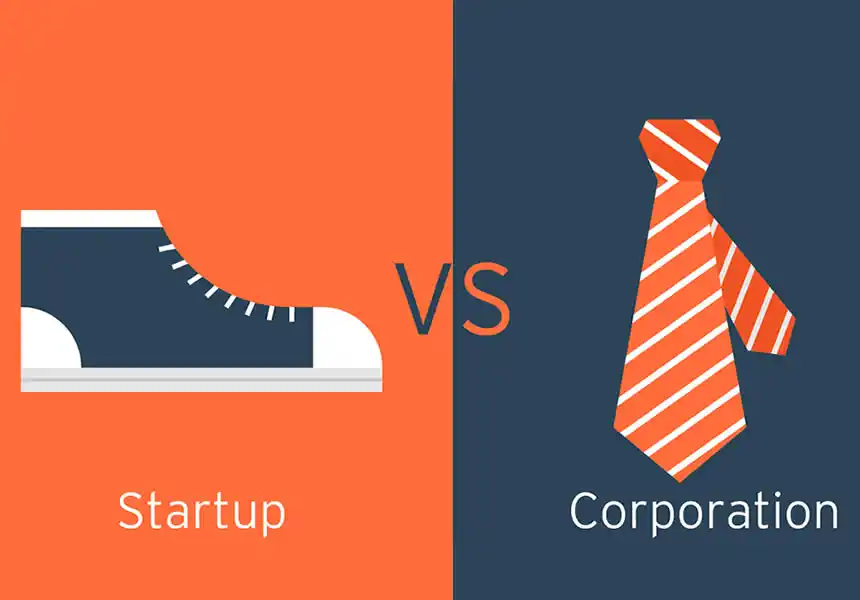Zeeshan and Karina Hayat on Understanding the Fundamental Differences Between a Startup and an Established Company

The term “startup” is often used interchangeably with “new business,” but that’s not entirely accurate. While all startups are new businesses, not all new businesses are startups. A startup represents a unique phase of growth, experimentation, and high uncertainty.
To understand the distinction, we need to break down what defines each and how they operate differently.
What Makes a Startup Different?
A startup is a temporary organization in search of a scalable and repeatable business model. Unlike traditional businesses that execute a proven model, these ventures are designed to explore, iterate, and pivot until they find a sustainable way to grow.
Startups are in the search phase—they are still experimenting with products, markets, and revenue models. Companies are in the execution phase—they already have a validated business model and focus on scaling operations.
This distinction impacts decision-making, resource allocation, funding strategies, and even company culture.
The Science Behind Startups
Startups operate much like scientific experiments. Rather than following a traditional business plan, they rely on a build-measure-learn feedback loop to discover what works and what doesn’t.
The Process: A Scientific Approach
- Hypothesis: Identify a problem and propose a solution.
- Experimentation: Test the idea with real customers.
- Validation: Gather data and assess whether the business model works.
- Iteration: Refine, pivot, or change direction based on results.
This approach encourages rapid learning, helping early-stage businesses avoid investing too much in unproven ideas. By testing assumptions early, they can minimize risk and increase their chances of success.
Unlike established businesses, which focus on refining existing processes, new ventures must embrace uncertainty and adapt quickly.
Key Areas of Experimentation
- Customer Discovery Early-stage companies begin by figuring out who their ideal customers are and what they truly need. Since there’s no established demand for their product or service yet, extensive market research and customer feedback are essential.
- Customer Validation Once the company identifies its potential customers, it needs to test whether people will actually pay for the solution. This stage ensures that demand exists before scaling operations.
Achieving product-market fit—where demand and supply align sustainably—is a major milestone. Without it, premature scaling can burn through funds without ensuring long-term viability.
Do Startups Have to Be Tech-Based?
While many assume startups must be tech-driven, their defining trait is innovation, not necessarily technology. A startup’s success lies in its ability to solve a problem in a unique and scalable way—whether through process efficiency, market disruption, or new business models.
Consider these examples:
- Airbnb redefined hospitality by turning private homes into short-term rentals.
- Chipotle innovated in the food industry by popularizing fast-casual dining with customizable meals.
These companies highlight that startups thrive on rethinking how industries work, whether technology is at their core.
The Evolution: From Startup to Industry Leader
Startups are built for agility, but to sustain long-term success, they must transition into scalable, process-driven companies. This evolution isn’t just about growth—it’s about shifting from rapid experimentation to structured execution.
Key milestones in this transition:
- Market Positioning: The company moves beyond early adopters and establishes itself as a recognized brand.
- Operational Maturity: Processes become standardised, and teams specialise in distinct functions.
- Financial Sustainability: Revenue generation stabilises, reducing reliance on external funding.
- Leadership Shift: Founders transition from wearing multiple hats to focusing on strategic decision-making.
Companies that master this shift—like Shopify, Tesla, and Stripe—retain their innovative mindset while building the foundations for sustained growth. The challenge isn’t just scaling—it’s doing so without losing the adaptability that made the startup successful in the first place.
The Challenges of New Startups vs. Established Companies
While these new businesses offer excitement and innovation, they also come with higher risks compared to established companies.
- Uncertainty and Risk: Startups often face uncertainty in product-market fit, customer demand, and business viability, while established companies have proven processes and brand recognition.
- Funding and Financial Constraints: Early-stage businesses often rely on venture capital (VC), angel investors, or bootstrapping, whereas established companies can access traditional financing like bank loans.
- Scalability and Infrastructure: Startups focus on finding a repeatable growth model before scaling, while established businesses already have scalable systems in place.
- Talent and Team Structure: Startups often have small, flexible teams, while established companies have structured teams with defined roles.
While new businesses may seem chaotic, their adaptability allows them to move faster and disrupt industries—a key advantage over established firms that might struggle with bureaucracy.
Conclusion
Recognizing which phase your business is in is vital for crafting an effective strategy. If you’re in the early stages, embrace experimentation and iteration as you search for product-market fit. Once you’ve validated your model, it’s time to shift focus to scaling and optimizing your operations.
Understanding where you are in this journey will guide your decisions, from funding and resource allocation to team structure and long-term growth. Whether you’re navigating the uncertainties of the early stage or building on a validated foundation, success lies in knowing when to innovate, when to refine, and when to scale.
So, where is your business today? Is it still shaping its model, or is it ready to execute and grow?
